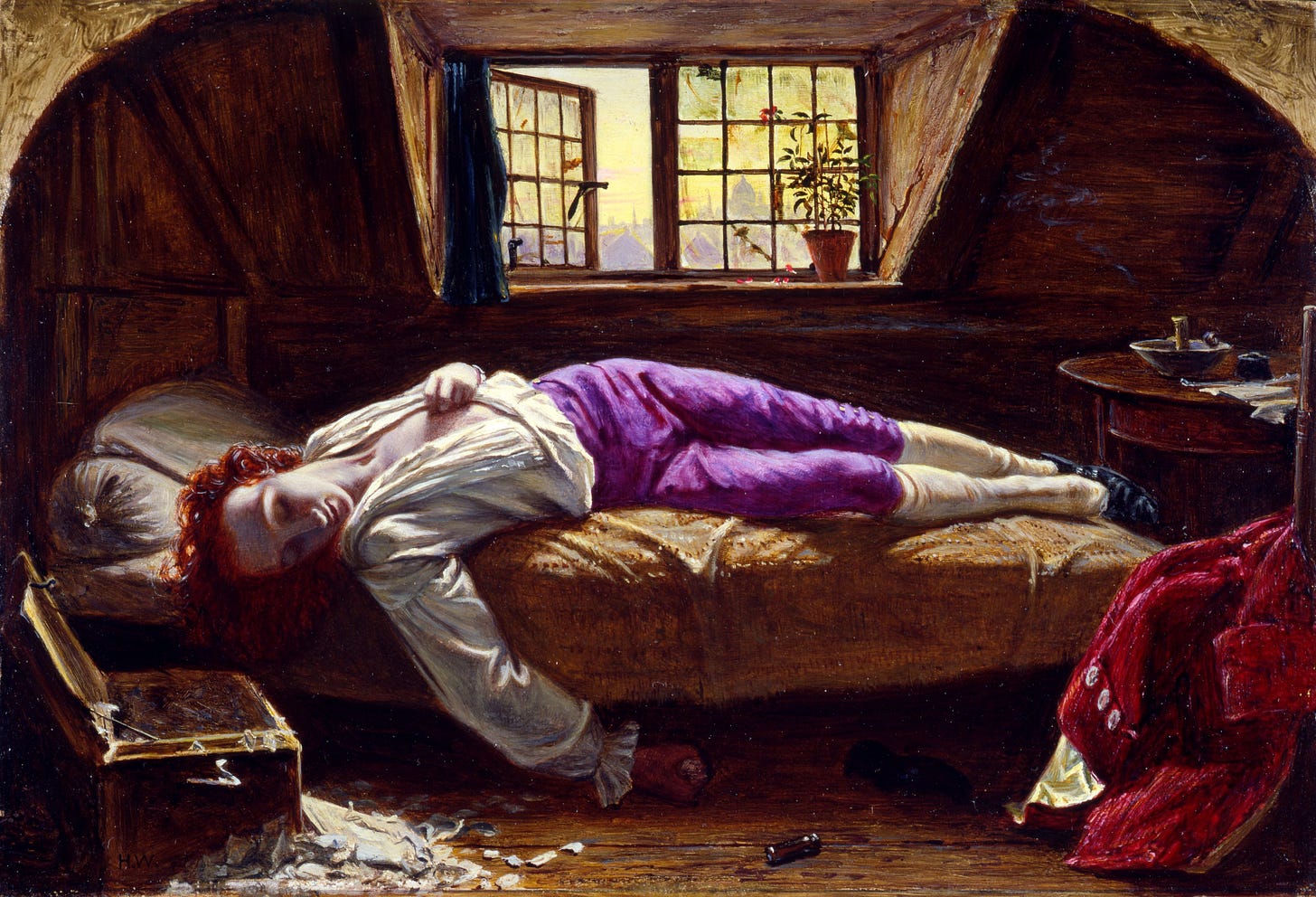What is revenge bedtime procrastination?
Our brains are trying to score some extra "me" time, whether it's good for us or not. No, it's not just you.
I don’t know about you, but sleeping has been rough recently. I don’t know if it’s the short days, stress, caffeine habits gone awry, or all of [gestures to the world] this, but getting a quality night’s sleep just doesn’t seem to be in the cards too often. Some nights it’s the falling asleep that’s the most elusive, but others it seems like my brain is fighting the REM cycle altogether and bouncing fully into consciousness every 90 minutes. Not cool, brain!

I’ve tried limiting screen time before bed (generally just okay), hot showers (get too warm), reading (enjoy the book too much), white noise (pretty good), mellow radio (too much music, not enough dulcet tones), a beloved TV show (want to watch), and CBD gel caps (pretty good). At some point I just keep getting frustrated with the whiplash of having five bad sleeps while using all of these methods and then, inexplicably, having the BEST SLEEP OF MY LIFE and being unable to replicate the conditions.
All the grimacing faces and knowing nods are present, hurtling through space and time to me while I write this. We’re in this together.
For me, the icing on top of this whole sitchy-ation is how hard it’s been to even start the bedtime process, knowing how much of a slog it often is. I find myself deep in the endless scrolling of Twitter or the explore tab on Instagram, migrating back to my workspace to revisit my “to read” tabs (so many tabs), writing this newsletter (no comment), or letting the autoplay queue up “just one more” episode of The Long Way Round or Ted Lasso knowing full well how late it’ll be when it ends. And as painful as it is in the morning (it’s always painful, no exceptions) to face the day after a deferred bedtime and fitful sleep, the hardest part is always on the other end in deciding to turn in to bed at all.
It’s not just me. Michelle is complicit, too. My mom has even admitted to watching Breaking Bad and The Queen’s Gambit well into the wee hours. I see those pals who are posting cat content on their Instagram stories past midnight. The online evening crowd is stronger and weirder than ever.

So what’s the deal? Are we all just self-sabotaging because that’s the world we live in right now, or is there something else at play? For me, it feels like trying to milk one last drop of choice and of pleasure from days that always end up blurring into one long mega-day anyway. Last night I referred to a fun thing I did “yesterday” that was actually five days ago. You can probably relate.
This phenomenon has a name, and it’s revenge bedtime procrastination.
Journalist and editor Daphne K. Lee came across this term in the summer:

The daily realities of life in a pandemic continue to be challenging at the best of times, whether monotonous, chaotic, demanding, and in many cases traumatic, life-threatening, or otherwise awful. It’s no wonder that people are looking to their late-night hours to reclaim some of the lost calm and control.
The first documented use of the phrase can be traced to a blog post from November 2018 by a man living in the Chinese province of Guangdong. In the post, he writes that he “belongs to someone else” during the workday and can only “find himself” and exert power over his life when he gets home. He wrote that the revenge bedtime procrastination was sad because it impacted his health, but it was also “great” because he could have a bit of freedom.
The “revenge” part of revenge bedtime procrastination has roots in the Chinese tech sector, where the culture of technology professionals demanded the gruelling “996” lifestyle. 996, for 9am to 9pm, six days a week.
Lu-Hai Liang writes, in a recent article for the BBC, that the phrase might have entered popular vernacular in China, but it describes a likely worldwide phenomenon that sees “over-stretched workers all over the world putting off bedtime to claim some precious personal time – even though they know it’s not good for them.”
One of the article’s subjects is Gu Bing, a 33-year-old creative agency director from Shanghai. Her home routine extends well past midnight, to the point where going to bed before 2am constitutes an early night. She recounts why those hours to herself (after the 996 and constant overtime) mean so much:
“Even though I am tired the next day, I don’t want to sleep early,” she says. Gu loved late nights in her 20s, but has started to think about adopting more “normal” sleeping habits. Yet her friends are often also awake in the middle of the night. “I really need that time. I want to be healthy but they [her employers] stole my time. I want to steal back my time.”
For Gu, staying up late instead of opting for a few more hours of sleep isn’t self-sabotage, it’s a small act of revolution. To reclaim the few moments of ownership over her life by “stealing back” the time she’d otherwise be using for sleep is the most control she can exert. It’s bleak, but it’s the best option considering the circumstances.
Especially with the blurred boundaries between home and work now, between always being reachable and working from home, it’s more important than ever to seek out time devoted to something other than work. It’s just that when the pursuit of leisure time eats into mental health stabilizing, immune supporting, stress reducing sleep, the trade-offs don’t appear to be as clear cut.
Although people might resent work squeezing their leisure time, reducing sleep is probably not the best ‘retaliation’. Sleep deprivation, especially long term, can lead to a host of harmful effects, both mental and physical. In Matthew Walker’s book Why We Sleep: Unlocking the Power of Sleep and Dreams, the neuroscientist is blunt: “The shorter your sleep, the shorter your life span.” And people, in general, know this: everybody interviewed for this article felt their sleep patterns were unhealthy – but they still kept late nights.
Psychology may explain the reason why people would choose to eke out this leisure time even at the expense of sleep. A growing body of evidence points to the importance of time away from work pressure; failure to detach can lead to stress, reduced wellbeing and burnout. “One of the most important parts of recovery from work is sleep. However, sleep is affected by how well we detach,” says Sheffield University’s Kelly. It’s important, she explains, to have downtime when we can be mentally distanced from work, which would explain why people are willing to sacrifice sleep for post-work leisure.
Kelly’s comments and Gu Bing’s testimony on the value of leisure time, no matter when it happens, point to an intrinsic search for a particular kind of health in some respects:
"My friends and I, we converse at night and sometimes we write songs together. It’s quiet and peaceful."
Writing songs with your friends in the middle of the night seems like a great way to unwind and exact some time-based revenge on a needy boss. Joy is revolutionary.
This makes sense in the context of bonkers work schedules and high-octane tech world culture. You get your kicks where you can, I suppose, and stick it to the man where you can, too. But for those of us deep in the pandemic-induced live-and-work-and-do-everything-from-home world, maybe it’s a different kind of control we’re looking for.

In an article about revenge bedtime procrastination for Lifehacker.com, Fordham University bioethicist Dr. Elizabeth Yuko says it best:
In short, everything feels so uncertain right now that naturally, we’re desperate to regain some (any!) aspect of control over our lives—even if it means losing precious sleep. Of course, it doesn’t take a global pandemic to spark revenge bedtime procrastination, but that’s certainly not helping matters right now. (We may be used to our lives feeling out of control, but it’s another level entirely when that sentiment extends to the entire planet.)
Sleep procrastination is a symptom of larger search for feelings of control, of power, and of autonomy over our own lives. It makes sense! Even in cases where the person exercising RBP isn’t necessarily exacting revenge on anyone in particular, acting out against the circumstances seems like a legit expression of autonomy.
The thing that strikes me as relevant here is that with unpredictable, stressful, or monotonous days, the urge to slow time down increases. As kids, we all had those nights where we wanted to fall asleep so the fun thing would happen faster. Birthday. Friend visiting. Favourite holiday. Going to the beach. This is maybe…the opposite of that.
Avoiding something that has an unknown outcome or that has felt less than stellar in the past is human nature. We want to know that what we’re headed for is a net good for our wellbeing. Extending the evening time as long as possible slows time down and it can feel like you get to put off starting the next day and doing it all over again. Makes good sense.
So if you find yourself saying “just one more episode” or “I still have time to cook an entire meal” or “I wonder how that book ends”, consider that tomorrow could be a good time to do those things. Do what feels good, though. Coping looks different for everyone!
If it’s becoming a serious issue, you have options that aren’t just cutting it out completely. There are still some small nuggets of revenge to be had - moderation is key, after all. Some options for curbing the assault on your daytime responsibilities can be as simple as injecting little bits of those evening activities into your existing routine. Crack open that book at lunch, treat yourself to takeout or a prepared meal to save on cooking time, or try to get it all out of your system on one or two designated nights a week if you’re feeling ambitious in your habit-breaking.
Here’s Dr. Yuko on managing rampant RBP tendencies:
If you truly can’t catch a minute to yourself during the day, at least acknowledge your revenge bedtime procrastination for what it is, and give yourself a time limit. For example, you can watch one episode of “Living Single,” and then it’s lights out. That way, you still have this time to do something you actually want to do, but it’s built into your day and comes with an endpoint.
Easier said than done, I think.
Who or what are you seeking revenge against? Ask yourself that the next time it’s well past bedtime and you’re diligently inspecting all the weird pores on your face in the bathroom mirror.
Now if you’ll excuse me, it’s 12:32am and I’m going to bed. Probably.





Out of desperation I've started a routine of doing 50 jumping jacks and at least ten pushups (girly, knee pushups) just before getting into bed. Like, seriously, in my jammies. It does some kind of hormonal thing to your brain-o. Works every time.